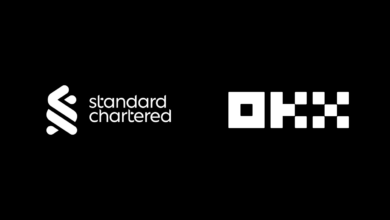Global Blockchain Business Value to Reach $2 Trillion by 2030

With investment on the rise, blockchain is expected to transform a wide variety of industries in the coming years
While still nascent today, blockchain business value, which refers to the cost savings and efficiencies that could be realized by incorporating blockchain into corporate business strategies, is projected to increase from $2.5 billion in 2017 to $2.0 trillion in 2030, according to IHS Markit, a world leader in critical information, analytics and solutions.
“Early adopters of blockchain have mostly been companies in the financial services industry, which use it mainly in payments-related solutions,” said Don Tait, senior blockchain analyst, IHS Markit. “However, the technology is poised to ripple through virtually every industry, affecting almost all organizations in the coming years.”
Although blockchain is still an emerging technology, it is expected to be transformative. According to the “Blockchain Vertical Opportunities Report” from IHS Markit, this technology demonstrates especially significant potential across the following vertical industry markets and application areas:
1. Financial
The financial vertical market, which includes financial services, insurance and financial technology (fintech), will primarily use blockchain to conduct cross-border payments, share trading, securities, claims management, derivatives, asset custody across both public and private markets, currency, collateral management and corporate actions processing. Because the market capitalization of all the world’s stock markets is equal to $73 trillion, even small cost savings and efficiency gains can lead to significant business value for companies and industries that decide to introduce blockchain technology.
“There is barely a day that goes by without a fresh announcement about how banks and financial institutions are seeking to use blockchain technology to transform significant parts of their business,” Tait said. “The financial vertical market will be the largest-value market to use blockchain.”
2. Supply chain and logistics
The supply chain and logistics industry is projected to improve significantly with the introduction of blockchain technology. Indeed, the World Trade Organization (WTO) estimates that the reduction of barriers throughout the supply chain could potentially increase global gross domestic product by 5 percent, and escalate total trade volume by 15 percent.
“Managing today’s supply chains, with all the links to creating and distributing goods, is extraordinarily complex,” Tait said. “Depending on the product, the supply chain can span hundreds of stages, multiple geographical locations, a multitude of invoices and payments, have several individuals and entities involved, and extend over months of time. Due to the complexity and lack of transparency of our current supply chains, there is interest in how blockchains might transform the supply chain and logistics industry.”
3. Identity management
Although identity management is not a vertical market, it is an application area that is used in many vertical markets. With the projected increase in the number of blockchain projects that are launched and become commercially deployed, the business value within the identity management sector is projected to reach $200 billion by 2030. The ID2020 initiative continues to promote and support blockchain technology to help the 1.1 billion people who live without an officially recognized identity.
“Digital identity is one of the oldest and hardest problems on the internet,” Tait said. “However, the World Wide Web Consortium is now standardizing the format for digitally signed credentials, and public blockchains can provide the decentralized registration and discovery of public keys needed to verify digital signatures.”
4. Retail and e-commerce
The initial uptake of blockchain in retail and e-commerce is projected to be led by trade promotions, decentralized marketplaces, payments, smart contracts, supply chain and other applications. With the increase in the number of blockchain projects that are launched and become commercially deployed within this vertical sector, the business value is projected to reach $164 billion by 2030.
“Using blockchain within the retail and e-commerce sector can lead to a direct relationship opportunity with the customer, providing companies with greater understanding of their needs and behavior,” Tait said. “Blockchain and smart contracts can also provide the tools and framework to create a new generation of marketplaces where the supply and demand sides can engage in trusted trading transactions, according to various business rules, without the need for a central brokerage entity.”
5. Healthcare
In the United States alone, counterfeit drugs cost pharmaceutical companies more than $200 billion annually in lost revenues. Blockchain could potentially help to minimize these losses. For this and other reasons, the business value from blockchain in the healthcare sector is projected to reach $134 billion by 2030. The initial uptake of blockchain within the healthcare sector is happening in the application areas of medical data management, drug development, claim and billing management, and medical research.
“Blockchain could be used to solve many issues that plague the healthcare industry today,” Tait said. “For example, it could be used to create a common database of health information across the gamut of electronic medical systems, spur higher security and more privacy, reduce administration time for doctors, and speed the sharing of research results that facilitate new drugs and treatment therapies.”





